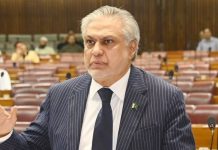ISLAMABAD: Local administrations are bound to provide security to election candidates and their rallies ahead of the July 25 polls despite not being informed beforehand, media reported, citing a statement from the Election Commission of Pakistan (ECP).
The new plan of action for the country’s politicians and electoral candidates was announced after the ECP’s approval and a meeting between the federal election regulatory body, security officials, and the ministries of interior, communications, and law and justice.
That the local authorities will be responsible for the security plans even if the party or candidate, who intends to hold a rally or meeting, does not inform them prior to the actual event.
 The meeting, which all four provincial chief secretaries joined via a video link, also concluded that the relevant policy will be implemented for the security of important politicians and candidates.
The meeting, which all four provincial chief secretaries joined via a video link, also concluded that the relevant policy will be implemented for the security of important politicians and candidates.
Expressing satisfaction at the ECP’s new code of conduct, the interior secretary said: “Almost 80 per cent of the problems will be resolved should it be properly implemented.”
In this regard, the Interior Ministry subsequently issued instructions to the provincial governments through a notification.
Election violence
Fears of violence on election day as well as during canvassing of votes has grown since the last week after a spate of attacks at election rallies and candidates.
On Monday, former federal minister and Pakistan Muslim League-Nawaz leader Sheikh Aftab Ahmed’s vehicle was fired at near Kamra, Attock. No one was injured in the incident.
Also on Monday, Awami National Party (ANP) leader Daud Khan Achakzai was injured after unidentified persons opened fire on the guesthouse of party’ candidate Zmrak Khan Achakzai in Chaman.
According to Levies officials, the firing incident occurred in Alizai area of Balochistan’s northwestern district of Qilla Abdullah.
The series of attacks began on July 10, when a bomb targeted an ANP rally in Peshawar, martyring party leader Haroon Bilour along with 21 others.
An attack on a Jamiat Ulema-e-Islam-Fazl (JUI-F) convoy in Bannu on July 13 followed the tragic Peshawar incident. The attack claimed lives of at least four people, while 10 others were injured in the explosion.
Later the same day, in what was one of the deadliest attacks in the country’s history, Balochistan Awami Party candidate Nawab Siraj Raisani along with 148 others was martyred when a suicide bomber blew himself up during an election rally in Mastung’s Darengarh area.
The intelligence and security agencies had warned of security threats in the run-up to the election on July 25 and said it will deploy more than 370,000 soldiers on polling day.



